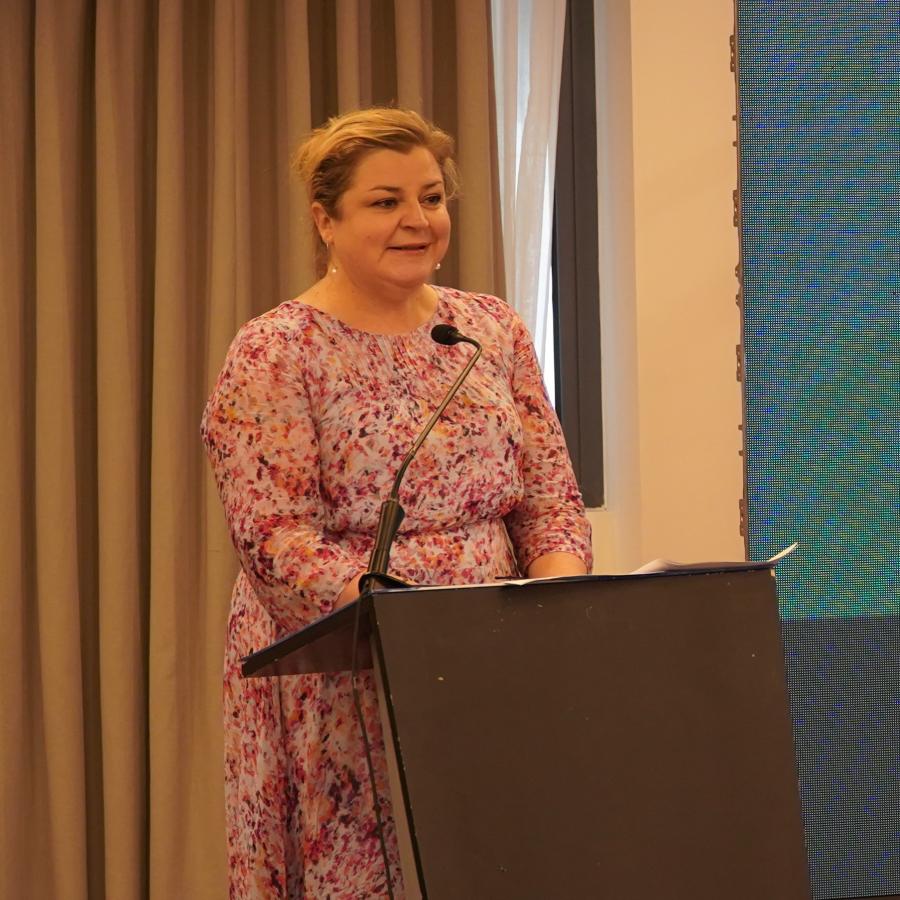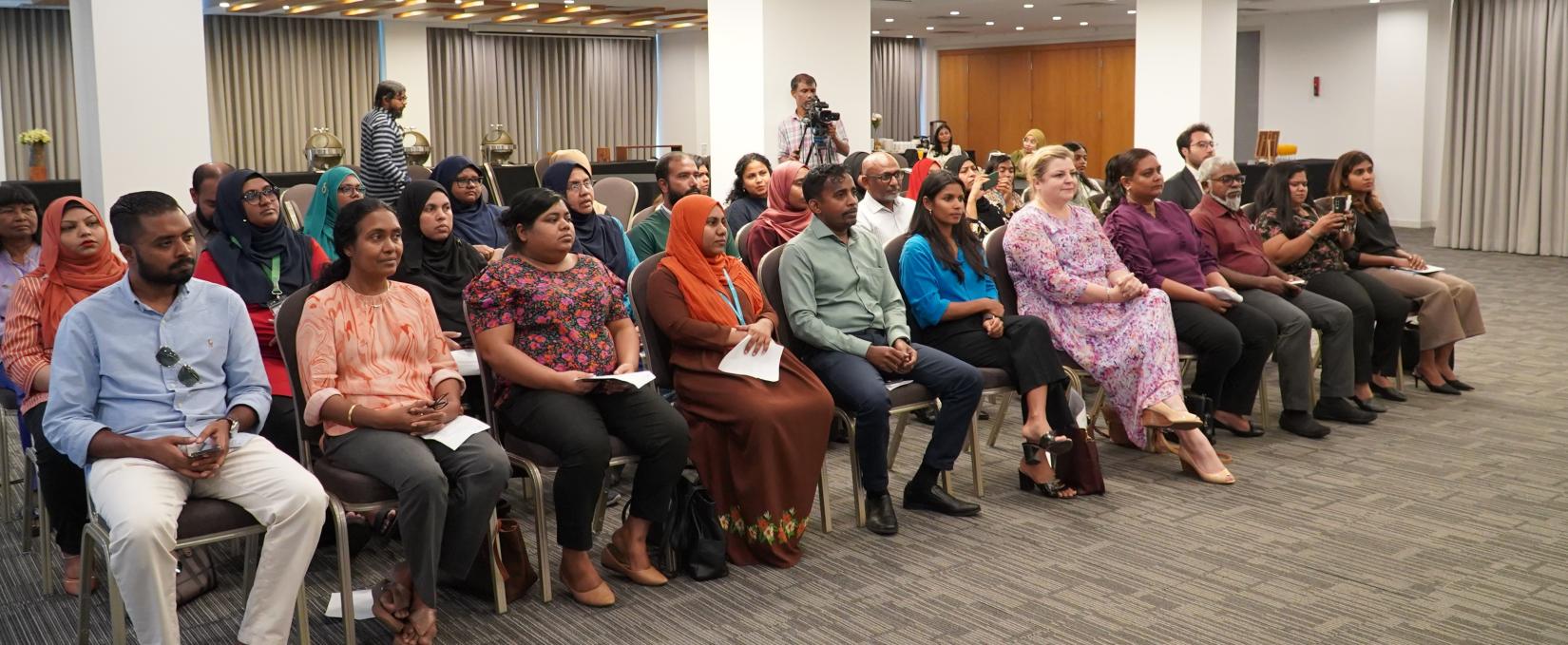Opening Remarks at the Launch of the Sustainable Development Goals (SDG) Learning Tool for Civil Society Organizations (CSOs)
UN RC Ms. Catherine Haswell's opening remarks at the Launch of the Sustainable Development Goals (SDG) Learning Tool for Civil Society Organizations (CSOs).

The Chief Guest of this ceremony is the Special Envoy for Climate Change at the President's Office, Her Excellency Sabra Ibrahim Noordeen.
Distinguished guests who have joined this event in-person and virtually from civil society organizations, local councils and Women’s Development Committees, Government institutions and UN family.
Assalam Alaikum and a very good evening to you all.
I am pleased to welcome you all to the launch ceremony of the Sustainable Development Goals (SDG) Learning Tool for Civil Society Organizations (CSOs).
As you know, the 2030 Agenda for Sustainable Development, adopted by all United Nations Member States in 2015, is our shared blueprint for peace and prosperity for people and the planet, now and into the future.
At its heart are the 17 Sustainable Development Goals (SDGs), which are an urgent call for action by all countries - developed and developing - in a global partnership. And while many people give the UN credit, the SDGs are not the UN’s SDGs! They are the global goals and are owned by all UN Member States and the people that they represent.
What is unique about the 2030 Agenda is the foundational engagement of civil society globally, regionally and nationally in the development of the agenda itself. This is why civil society continues to be recognized as an equal leader globally in moving us forward together.
Achieving the SDGs requires the active involvement of all stakeholders: national, regional, and local governments, the private sector, civil society, academia, UN system and people at large. Success depends on pursuing a whole-of-government and whole-of-society vision with an eye to meeting the high ambitions and challenges of the goals.
Ladies and Gentlemen,
We stand here at the mid-point of the 15-year agenda.
For the good news, the latest data from the SDG Roadmap 2022 show that Maldives is making good progress and may reach the goals on no poverty (Goal 1), sustainable cities and communities (Goal 11) and partnership for the goals (Goal 17) by 2030.
Good progress, but in need of acceleration, has been achieved on the goals on good health and well-being (Goal 3), quality education (Goal 4), clean water and sanitation (Goal 6), decent work and economic growth (Goal 8), life below water (Goal 14, on weak evidence) and life on land (Goal 15).
We need to intensify efforts to make progress on zero hunger (Goal 2), gender equality (Goal 5), affordable and clean energy (Goal 7), industry, innovation and infrastructure (Goal 9), reduced inequality (Goal 10, weak evidence) and responsible consumption and production (Goal 12).
And finally, we need to identify and gather the data needed to make an assessment on progress on the goals on climate action (Goal 13) and peace, justice and strong institutions (Goal 16).
This is why the UN Secretary General has issued an urgent global call, to mobilise and strengthen leadership and political will to rally together to keep the vision of the SDGs a reality.
That is why we are here today.
The SDG learning tool being launched today provides a practical tool for civil society organizations in supporting the 2030 Agenda.
The aim of the tool is to support civil society organizations to motivate individuals, communities and companies to engage in joint action, to work together to protect the environment and to protect people.

Ladies and gentlemen,
I take this opportunity to also appreciate and thank the partnerships and collaborations that have enabled us to jointly develop this learning tool.
This has been an initiative funded through the Multi-Partner Trust Fund to accelerate the achievements of SDGs under the leadership of UN Resident Coordinators globally. Our partner in the Maldives has been FJS Consulting who carried out the creation and web hosting of this learning tool. I cannot thank the FJS course development team enough for their faith in this work and helping us through the obstacles to get here today. Thank you.
This customization of the content, and its being made freely available to all Maldivians in both English and Dhivehi would not have been possible without some key collaborations. The full list of those who have stuck with us throughout are available on the website, to be sure we do not leave anyone out!
Thank You
Therefore, on behalf of the whole UN Maldives team, I extend a heartfelt appreciation to the interviewees and contributors from government and state entities, CSOs, local authorities, individuals, and UN agencies who provided substantive input to the final product.
Ladies and gentlemen.
In less than a month’s time, the UN will convene the SDG Summit. It is imperative that we all renew our commitment to the SDGs, mobilize multistakeholder partnerships and energize individual action for change.
We need to channel the sense of hope, optimism and enthusiasm that characterized the adoption of the 2030 Agenda in 2015 and generate a surge of momentum that drives ambitious and transformative implementation efforts between now and 2030.
Because, as UN Secretary General António Guterres forewarns, “Unless we act now, the 2030 Agenda will become an epitaph for a world that might have been”.
In closing, I hope you find the tool valuable, and keep in touch on how we can continue to collaborate to accelerate progress for a better future for the Maldives.
Thank you.

















